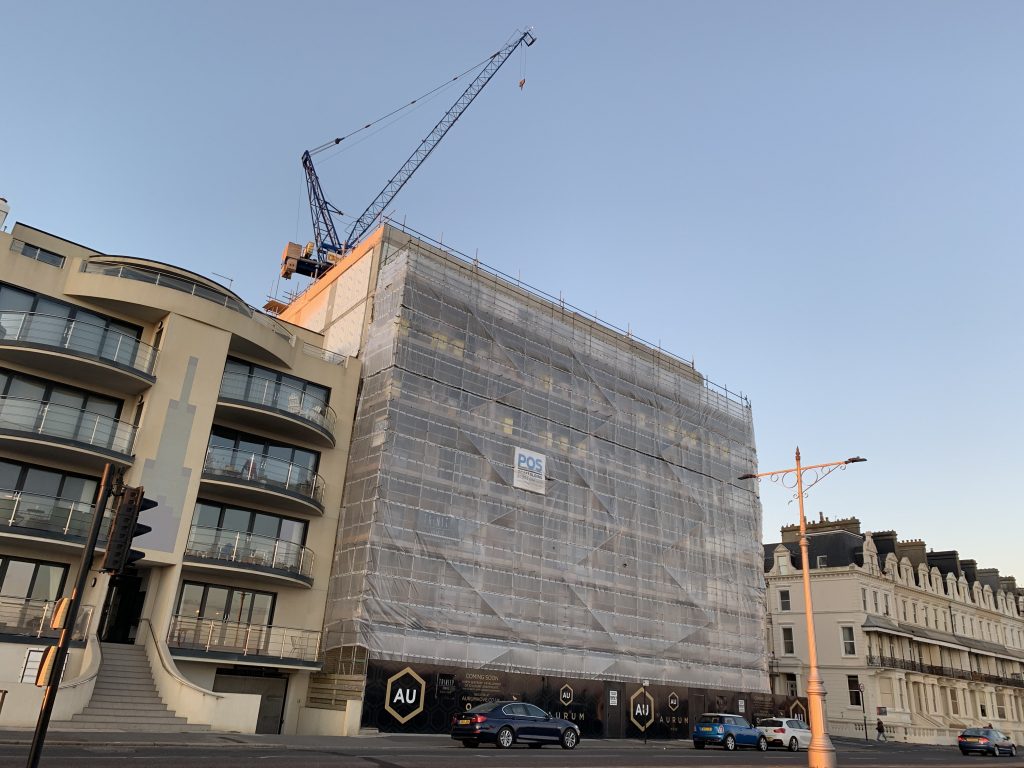A relative sent me a link to a newspaper article on property development today.
“If we have a new tax, it must be this” writes Liam Halligan in The Telegraph.
He favours a “supply side” tax on developers to increase house building.
“What would you say to this?” my relative asked. Well, now I’ve fixed a plaster to stem the bleeding caused by banging my head against a wall, I’ll tell her – and you.
For those who can’t be bothered to google the article or would rather eat your own hand than read The Telegraph (not me, I read it), I’ll summarise his article first.
- Despite the predicted slow-down in the housing market, house prices remain high (compared to wages, for example). Home ownership is falling. The best way to decrease prices is to increase supply.
- Help To Buy didn’t work and if anything helped increase prices and disproportionately helped larger developers.
- Small developers are losing market share to large developers (down to just 10 per cent). Smaller developers deliver sites as soon as they get planning as they don’t “land bank” sites to wait for values to increase.
- “Planning gains” (a rise in the value of land when planning permission is granted) are made on agricultural land in particular. Developers should be taxed on this, splitting it 50:50 with local councils to be spent on infrastructure (a “supply side” tax like those on energy companies).
- This would increase housing and lead to a building boom.
…
There is a lot here to agree with but I’m afraid the conclusion in particular is hopeless nonsense.
In my book, if you are going to deal with a problem, the first rule is to correctly identify that problem and the second is to take action to directly solve it.
Sounds simple, yes? If you’re unblocking a sink, finding the blockage and removing it is simple.
But if you’re trying to solve the housing crisis, it requires a bit more than an hour of swearing and the cunning use of a metal coat hanger.
And the more people who have an opinion, the harder it is to find the right one.
So, what is the real problem here? House prices are high because we don’t build enough houses to cope with demand. In the main, this is true. There are other factors, but we can leave that for another day.
In short, Mr Halligan is right, we do need to increase supply. He is also correct to say Help to Buy didn’t work and that the monopoly of large house builders controlling the market is a negative (although land-banking is something between a complete myth and a massive misunderstanding of the system).
Now we have identified the nub of the problem (not enough new houses and too many being built by the wrong people), how do we solve it?
His answer – to tax developers – is just playing to the public, I’m afraid. Now I know everyone loves a bit of developer bashing but let’s think this through.

If we decide we don’t have enough new drugs for cancer, it makes no sense to say – every time a pharmaceutical company invents a new one – that we should tax the hell out of them for doing so. It doesn’t seem like a great encouragement to succeed, does it.
I also really don’t understand the argument that half the money should be given to local councils to spend on infrastructure.
When planning permission is granted for major sites, developers have to pay huge amounts towards that already – and millions more is available through government programmes such as the Towns Fund. How would this new tax directly lead to more houses being built?
The tax appears to be for small and large developers alike – so how does that reduce the monopoly of the bigger firms?
It is also targeted at housing on agricultural land because housing in cities doesn’t work like that. On brownfield sites, viability is already an issue and adding extra cost (tax) will reduce housing supply, not increase it. Existing land values won’t greatly decrease just because taxes rise – the two aren’t related at all.
At a council Planning Committee meeting that I attended not that long ago, a lady asked what the council was doing about the high house prices in the area.

The reply was that the council was trying to work with developers to get approvals through as efficiently as possible.
When our planning application that followed was then refused for completely nonsensical reasons, the lady and her friends applauded and cheered approvingly. No one seemed to spot the irony.
And so, let’s face reality. The blockage is the planning system. It is increasingly difficult to get new houses approved – too many rules, too many unnecessary reports, far too much power in the hands of “Nimby” (not in my back yard) objectors, committees and planning officers at odds – the problems have long been the same.
Myself and others were asked by Brighton and Hove planners this month how to help improve things locally.
We came up with a long list and I’ll let you know how that goes – but funnily enough laying on extra taxes, like some kind of negative bonus system, deployed every time we delivered the very thing that we’re being asked for … that wasn’t something anyone suggested.
We need to make targeted positive changes, not more negative ones to please the court of public opinion and little else.
Ed Deedman is a director of Cayuga Homes.









“Property developer says don’t tax property developers.”
Fancy that.
Er, that’s not actually what it says.
Indeed. In fact I’m more than happy to pay my share, including the increase in corporation tax and so on.
The points I’m making here are that developers aren’t the main source of the restricted housing supply and that promising people extra tax is a strange kind of incentive in any case.
Best, Ed
We’ve been here before with Ed. He is not a big developer and does what he does, tax or no tax. That’s his issue. What the so-called NIMBYS (or at least some of us) are extremely anxious and worried about is people (and I use the word very loosely because cynical mega-developers in smart suits are not at all bothered about adjoining residents) like Berkeley Homes wanting to build totally inappropriate tower blocks for foreign investors very literally in our back yards, cutting off all our daylight, overlooking us, making our outside spaces totally unusable. That’s what some of us so-called NIMBYS are concerned about, not a few minor developments by the likes of Ed. Sorry, Ed, you have to make a crust, I know, but there are major development issues very much bigger than you in this City.
Good evening Fed-up with Brighton Politics. Just to be clear, I didn’t say that everyone who objects is a NIMBY. Plenty of people have perfectly good reason to object to object to planning applications. The circumstances you describe above seems absolutely something that you, I, or indeed anyone else would quite rightly object to.
The point I made was a) that there are a lot of people out there who aren’t interested in anything other than objecting and frequently haven’t even looked at the application when they object, and b) that too much power rests with the most vocal in society rather than the largely silent majority.
I don’t believe in any way that every development should just get waived through – I just want more objective appraisal of applications.
All the best, Ed
You are sort-of right, Ed, and I apologise for lumping you in with a particular huge gripe that we have over here in East Brighton, but we are being absolutely stuffed by the ridiculous gasworks planning application, which is now just one week short of a year since it went in and going nowhere. No communication from the developer with residents at all (and precious little beforehand) and nothing meaningful from the council in all that time; hundreds of us have objected and still total silence from all of them, plus obstruction and obfuscation from the council about what has gone on with the developers before the planning application.
This is why a lot of us get hugely irate about proposed developments – not every development obviously – and developers in general. It’s the
‘people’ like Berkeley Homes who really get locals hacked off for their uncaring and unashamedly profiteering attitude. Are they intending to provide homes – no, they are not, just hundreds of high-rise flats and a few town houses that are not affordable for anyone much who actually needs a proper home. They do nothing for the housing shortage, do not provide proper homes and such proposed developments are basically just investment properties for anyone who has the considerable money.
All the best.
Thanks – and of course one of the points made in the original article from Liam Halligan was that too much development (90%) is done by the larger companies. Of course I’m biased in agreeing with that, but no one has yet come up with a solution for it yet…
In terms of communication I’ve learnt a lot in Shoreham about listening to residents / undertaking consultations that I’ll be taking forward to new sites. It is a new(ish) way of doing things and can be hugely frustrating at times (for everyone) but it is something developers need to learn to do better. That said, it is a two way thing. For every resident who thinks developers only care about profit is a developer who thinks everyone is a NIMBY! We all need to do a better job understanding everyone’s point of view where possible.
Sort-of agreed, Ed. However, this major developer never engaged meaningfully at all – did all the ‘pseudo-engagement’ during Covid electronically and ignored almost all of the responses, except a few very minor things. There has never been a public event (still nothing after all this time, even though Covid restrictions have been off for some time), no exhibitions, models or consultations – nada. Nearly all official bodies who have commented – like the fire authority, health people, traffic people and all that, have major objections and still this firm hasn’t responded in a public forum. No wonder that many of us are totally hacked off with developers. Meaningful dialogue is key to successful development, but the shower I’m talking about don’t do any of that.
Stop objecting to the next generation having nowhere to live. People like YOU are the reason they have no stake in society, because people like YOU put yourself before others.